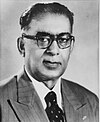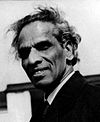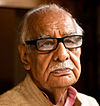
A Commonwealth realm is a sovereign state within the Commonwealth that has Charles III as its monarch and ceremonial head of state. All the realms are independent of the others, though one person, resident in the United Kingdom, acts as monarch of each. The phrase Commonwealth realm is an informal description not used in any law.

The Government of India is the central executive authority of the Republic of India, a federal republic located in South Asia, consisting of 28 states and eight union territories. The government is led by the prime minister who exercises the most executive power and selects all the other ministers. The country has been governed by a NDA-led government since 2014. The prime minister and their senior ministers belong to the Union Council of Ministers—its executive decision-making committee being the cabinet.

A princely state was a nominally sovereign entity of the British Indian Empire that was not directly governed by the British, but rather by an Indian ruler under a form of indirect rule, subject to a subsidiary alliance and the suzerainty or paramountcy of the British crown.
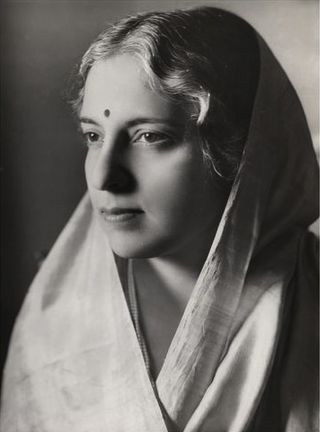
Vijaya Lakshmi Pandit was an Indian freedom fighter, diplomat and politician. She served as the 8th President of the United Nations General Assembly from 1953 to 1954, the first woman appointed to this post. She was also the 3rd Governor of Maharashtra from 1962 to 1964. Noted for her participation in the Indian independence movement, she was jailed several times during the movement.

The Constituent Assembly of India was partly elected and partly nominated body to frame the Constitution of India. It was elected by the Provincial assemblies of British India following the Provincial Assembly elections held in 1946 and nominated by princely states. After India's independence from the British in August 1947, its members served as the nation's 'Provisional Parliament', as well as the Constituent Assembly. It was conceived and created by V. K. Krishna Menon, who first outlined its necessity in 1933 and enshrined it as an Indian National Congress demand.

The territorial evolution of the British Empire is considered to have begun with the foundation of the English colonial empire in the late 16th century. Since then, many territories around the world have been under the control of the United Kingdom or its predecessor states. When the Kingdom of Great Britain was formed in 1707 by the union of the Kingdoms of Scotland and England, the latter country's colonial possessions passed to the new state. Similarly, when Great Britain was united with the Kingdom of Ireland in 1801 to form the United Kingdom, control over its colonial possessions passed to the latter state. Collectively, these territories are referred to as the British Empire. When much of Ireland gained independence in 1922 as the Irish Free State, the other territories of the empire remained under the control of the United Kingdom.
The Indian Civil Service (ICS), officially known as the Imperial Civil Service, was the higher civil service of the British Empire in India during British rule in the period between 1858 and 1947.

The Dominion of India, officially the Union of India, was an independent dominion in the British Commonwealth of Nations existing between 15 August 1947 and 26 January 1950. Until its independence, India had been ruled as an informal empire by the United Kingdom. The empire, also called the British Raj and sometimes the British Indian Empire, consisted of regions, collectively called British India, that were directly administered by the British government, and regions, called the princely states, that were ruled by Indian rulers under a system of paramountcy. The Dominion of India was formalised by the passage of the Indian Independence Act 1947, which also formalised an independent Dominion of Pakistan—comprising the regions of British India that are today Pakistan and Bangladesh. The Dominion of India remained "India" in common parlance but was geographically reduced. Under the Act, the British government relinquished all responsibility for administering its former territories. The government also revoked its treaty rights with the rulers of the princely states and advised them to join in a political union with India or Pakistan. Accordingly, the British monarch's regnal title, "Emperor of India," was abandoned.
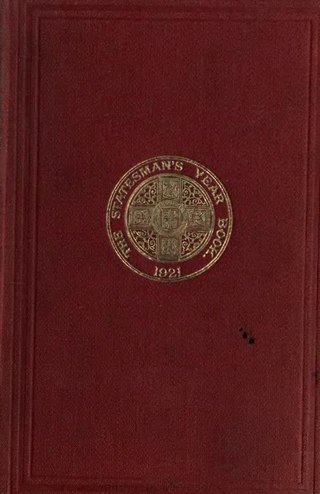
The Statesman's Yearbook is a one-volume reference book published annually since 1864 providing information on the countries of the world. It is published by Palgrave Macmillan.

Jayanto Nath Chaudhuri, was an Indian general who served as the 5th Chief of Army Staff of the Indian Army from 1962 to 1966 and the Military Governor of Hyderabad State from 1948 to 1949. After his retirement from the Indian Army, he served as the Indian High Commissioner to Canada from 19 July 1966 until August 1969.

In the Commonwealth of Nations, a high commissioner is the senior diplomat, generally ranking as an ambassador, in charge of the diplomatic mission of one Commonwealth government to another. Instead of an embassy, the diplomatic mission is generally called a high commission.
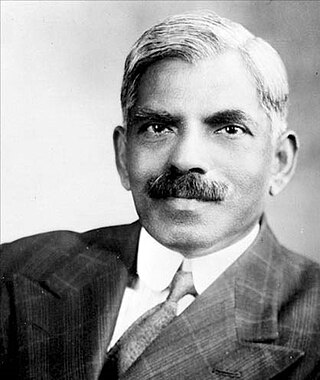
SirArcot Ramasamy Mudaliar was an Indian lawyer, diplomat, and statesman who was the first president of the United Nations Economic and Social Council and the 24th and last dewan of Mysore. He also served as a senior leader of the Justice Party and in various administrative and bureaucratic posts in pre- and Independent India. He was a prominent orator and was known for his inspiring speeches.
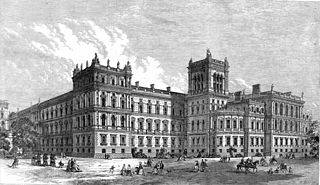
The Colonial Office was a government department of the Kingdom of Great Britain and later of the United Kingdom, first created in 1768 from the Southern Department to deal with colonial affairs in North America, until merged into the new Home Office in 1782. In 1801, colonial affairs were transferred to the War Office in the lead up to the Napoleonic Wars, which became the War and Colonial Office to oversee and protect the colonies of the British Empire. The Colonial Office was re-created as a separate department 1854, under the colonial secretary. It was finally merged into the Commonwealth Office in 1966.

India–United Kingdom relations, also known as Indian–British relations or Indo–British relations, are the international relations between the Republic of India and the United Kingdom of Great Britain and Northern Ireland. India has a high commission in London and two consulates-general in Birmingham and Edinburgh. The United Kingdom has a high commission in New Delhi and six deputy high commissions in Mumbai, Ahmedabad, Chennai, Bangalore, Hyderabad and Kolkata. Both countries are full members of the Commonwealth of Nations.
A dominion was any of several largely self-governing countries of the British Empire, once known collectively as the British Commonwealth of Nations. Progressing from colonies, their degrees of colonial self-governance increased unevenly over the late 19th century through the 1930s. Vestiges of empire lasted in some dominions well into the late 20th century. With the evolution of the British Empire following the 1945 conclusion of the Second World War into the modern Commonwealth of Nations, finalised in 1949, the dominions became independent states, either as Commonwealth republics or Commonwealth realms.

From 1947 to 1956, the Dominion of Pakistan was a self-governing country within the Commonwealth of Nations that shared a monarch with the United Kingdom and the other Dominions of the Commonwealth. The monarch's constitutional roles in Pakistan were mostly delegated to a vice-regal representative, the governor-general of Pakistan.
Sir Bhupendra Nath Mitra was an Indian government official and diplomat who served as the third Indian High Commissioner to the United Kingdom from 1931 to 1936.
Dewan Bahadur Sir Samuel Ebenezer Runganadhan was an Indian educationist who served successively as Vice-Chancellor of Annamalai University and Madras University and as the last High Commissioner for India from 1943 to 1947.
Shiv Shankar Mukherjee is an Indian civil servant and was the High Commissioner of India to the United Kingdom from 2008 to 2009.




